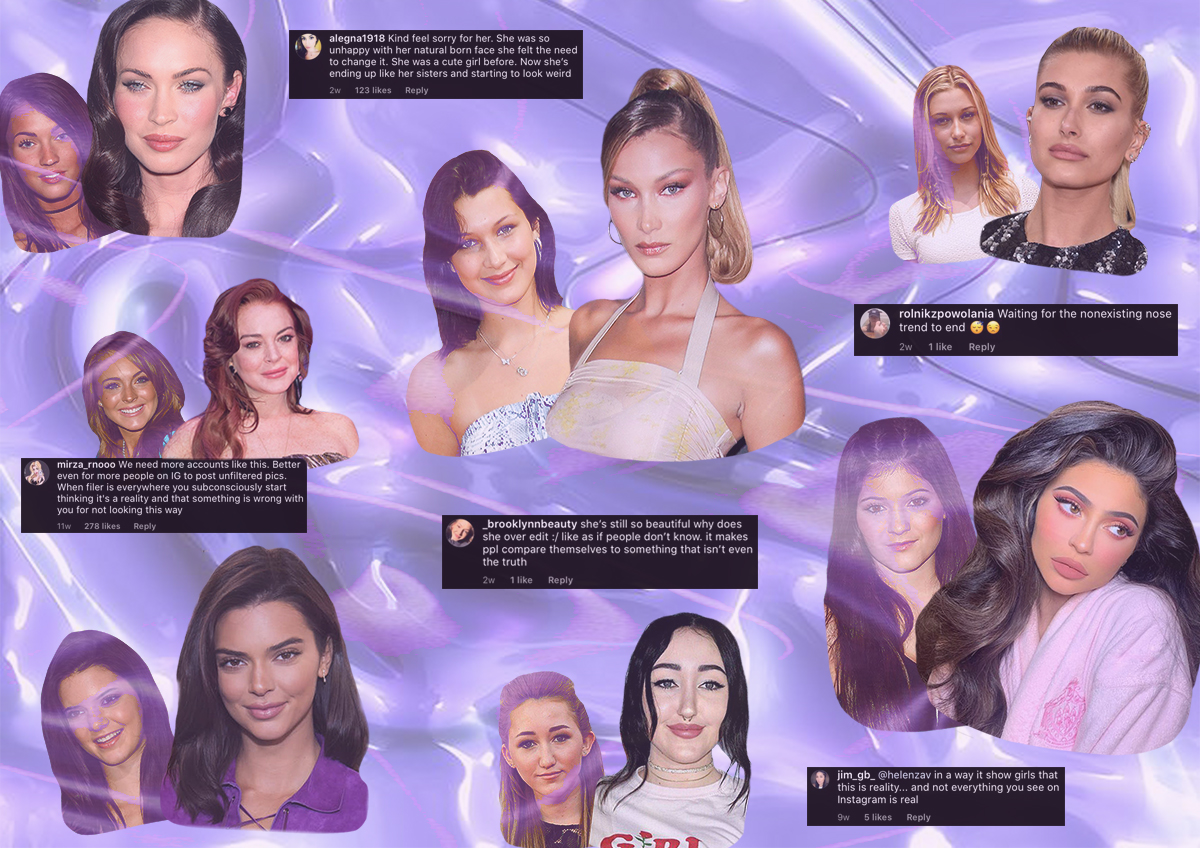Instagram Babe @oceau: My name is Bella and I'm a proud chicana residing in Los Angeles. My…
Instagram Vs Reality
Are celebrity call-out accounts on Instagram doing harm or good... or a little bit of both?12 May 2020
“WELCOME TO REALITY” shouts @celebface’s all-caps tagline in a brashly fitting introduction for what has become one of Instagram's most notorious ‘call-out’ accounts.
Armed with a hefty 1.3 million followers, @celebface is dedicated to uncovering the truths behind celebrities’ instagrams.
The account analyses lip fillers, laughs at botched photoshop attempts, and exposes distorting edits. “If you don’t want to see the truth, leave this page,” the bio reads, as foreboding as a Shakespearean prologue. As I digest the words, my finger slows from scrolling. Do I want to see the truth? I wonder, half-heartedly, before curiosity takes hold and I dive in.
The truth, it turns out, is not the cold-blooded crime-scene I had anticipated, but instead an angry jumble of grainy paparazzi pictures and zoomed-in shots of the Kardashians’ pores. Initially I gawp, nastily fascinated at seeing so many famous female figures—each revered for their beauty—in various states of compromise. “Britney, I don’t understand you”, reads a caption underneath a wonkily facetuned upload from Britney Spears. “Remember, you can’t Facetune your energy…but you can always Facetune your face,” says another, alongside two contrasting images of Khloe Kardashian.
As if our long-standing societal scrutiny over the female body wasn’t enough, @celebface takes women and places them under a microscope—examining their every pore, line, and crevice with forensic precision. The result is cruel, but I wonder if this was ever the intention.
“My account’s goal is to help people realise that what they see on social media isn’t real life,” the anonymous organiser of fellow call-out account @s0cialmediavsreality explains to me over email. “I want people, especially young women, to stop beating themselves up over a pimple and stop thinking that celebrities are perfection.”
@s0cialmediavsreality follows a similar, albeit less aggressive, style to @celebface. The formula is simple: two pictures of the same celebrity are placed side-by-side. Sometimes the post features the original version of a photo, in contrast with the edited version, with the aim of exposing the manipulative power of photoshop. But often the pictures are from entirely different occasions, and stylised magazine photoshoots go head-to-head with fuzzy, bare-faced paparazzi images. The caption, however, is nearly always the same: “Instagram Vs. Reality”. If it sounds unfair, it’s not supposed to be. Throughout our communication, @s0cialmediavsreality assures me that their account is, as their bio explicitly states, “Not a hate page [heart emoji] [praying hands emoji]”.
“Some people think I’m putting a celebrity down just by posting a real picture of them with acne or cellulite,” the email continues, “but I’m just trying to make all those things normal again, because society and social media have made all of those things [be] seen as unattractive and gross.”
This is a seemingly sensible cause, worthy even, and one that in theory I want to support. But, while I don’t question the account’s good intentions, I can’t escape a nagging pity for the celebrities (nearly always women, nearly always young) who are being routinely stripped of their agency. Fairly calling-out photoshopping is one thing, using non-consensual paparazzi images to pedal a ‘Stars! They’re Just Like Us!’ clickbait narrative is another. @s0cialmediavsreality is right: acne and cellulite should be normalised, but it should be left to the women in the images to make this decision about their own bodies. “I know that if it was me in their shoes,” I ramble in another email to @s0cialmediavsreality, “I would feel so insecure and distressed.”
There is an easy tendency to disassociate celebrities from having real, sometimes horrible, human emotions. With influencers, those ‘famous just for being famous’, the dismissal is even more straightforward. After all, how can they complain about the pitfalls of fame when they actively seek it out. They were asking for it. A lot of this criticism is probably warranted. Propped up in their marbled mansions, celebrities assume one of the most unequivocally privileged positions in society. It’s hard to imagine having cause to be upset when you’re a conventionally beautiful supermodel, with an endless supply of money and salads. But while celebrities’ wealth and status may entitle them to power and luxury, I doubt it shields them from very human bouts of sadness and insecurity.
Protecting the mental health of celebrities matters to @s0cialmediavsreality. “I do worry about that,” they explain, “but I want celebrities to also not feel threatened by an unphotoshopped picture. I want them to accept themselves the way they are and stop worrying about society seeing them as human and real.” Again, I understand their point, and agree even, but I still don’t feel the urge to make this decision on others’ behalf.
Creating a positive atmosphere was paramount when wellness dietitian and aesthetic consultant, Dana Omari, began her Instagram account @igfamousbodies. At 114k followers, @igfamousbodies is unusual in that it is resolutely pro-surgery. From the outside, @igfamousbodies looks much the same as @celebface or @s0cialmediavsreality—a mosaic of celebrity ‘before and after’ shots. The captions, however, reveal something entirely different. “Kendall’s nose job, lip filler, brow lift, and general glow up. She looks INCREDIBLE!!,” gushes one caption accompanying a collage of Kendall Jenner, “She looks fabulous!,” a commenter chimes in.
“I try to keep the focus on what procedures [celebrities] have had done or where the photoshop signs are,” Dana tells me “and I may give a complimentary opinion such as, ‘Her lips injections are beautiful! They look natural and perfectly proportionate on her face!’”
Flicking through @igfamousbodies is, to put it bluntly, strange. But there’s also something oddly refreshing about its candour and positivity. Here, cosmetic procedures are chatted about in a way that is casual and, crucially, non-judgemental. I may be undecided as to where I stand on plastic-surgery more generally, but I cannot deny the funny charm of @igfamousbodies and its brand of relentless positivity.
What I do question Dana on, however, is whether or not we have any right to know all of this. Whilst I understand her desire to de-stigmatise surgery, are celebrities who undergo procedures not entitled to their privacy? As far as I am concerned, Kendall Jenner is a fully-functioning, adult human-being, and can spend her money however she likes. If she wants lip-fillers? Absolutely fine. Am I obliged to know about them? Absolutely not. And, above all, who cares?
“So, the thing about being a celebrity,” Dana reasons with me, “especially Instagram influencers, is that they are a commodity. Most celebs who say nothing [about their presumed surgery] also aren’t selling anything. For example, Angelina Jolie maybe doesn’t have to announce her procedures, but at the same time, she’s not trying to sell me makeup, skincare, or workout routines.” I am slightly stunned. The notion of someone’s surgically-altered body becoming a form of false-advertising, is something that, truthfully, I had never considered. In this instance, it is a valid point.
At the start of researching this piece, it was these issues of agency (or the lack of it) that bothered me.
Arguments that by simply having a public platform allows for public scrutiny, to me, lack humanity and empathy. I felt, and I still feel, that celebrities are not public property, and their bodies are not up for debate.
Several weeks on, however, my anxieties have shifted. Now, my real worry lies in the consumer, and what it is that we at home gain from looking at these accounts. When I first scrolled through @celebface, the appeal seemed to be nothing more than simple schadenfreude. “Her plastic surgeon should receive an award,” one comment reads, underneath two strikingly different pictures of Bella Hadid at the start and end of the decade. A very small (and very embarrassing) part of me agrees; there is something strangely gratifying, reassuring, in knowing that the most scientifically beautiful woman in the world, is just that—a product of science.
But eventually, I cannot help but notice that beyond the immediate hit of reassurance, there is something unsettling and addictive about these accounts. During one recent session browsing @celebface, I check the time and realise that over twenty minutes have gone by. I am three years deep into the account. The more I wade through endless shots of double-chins, my own lit-up only by the glare of my iPhone, the less I feel this promised rush of confidence. Instead, I marvel that people obsess over others so much. I imagine this same level of scrutiny being applied to my appearance. Dazed, and a little ashamed, I click the lock of my phone and let my screen snap to black.
To be upfront: I worry, sometimes incessantly, about the way I look. On a bad day, if you played my thoughts out loud they would be one long, tedious, continuum of stress. How do I hide the spot on my chin? Why is my hair so flat on top and so frizzy at the bottom? Are my eyes always this skewed or is it just hay fever? Does my nose look normal from the front but not from the side? To combat this, I remind myself that, in fact, everyone else is too busy thinking about their own spots, frizzy hair, wonky eyes, or funny noses, to pay any real attention to mine. We are more than the sum of our parts. It is a valuable, slow-burn of a lesson, that I take immense comfort in. It is also something I fear that these Instagram accounts, despite their good intentions, work to undermine.
I unfollowed @celebface that evening and my newsfeed seemed to exhale. Looking at their bio now I can’t help but laugh. They warned me, after all, that if I didn’t want to see the “truth” I should just leave their page. I probably should have listened.
_
Original artwork created exclusively for YEOJA Mag by Nilufar Zarre. For more opinion pieces, click here.








